In this article:
Loose motions or diarrhea is a common digestive disorder that occurs when the normal functions of the small and large intestines are disrupted, leading to an imbalance in the absorption of ions, substrates, and water.
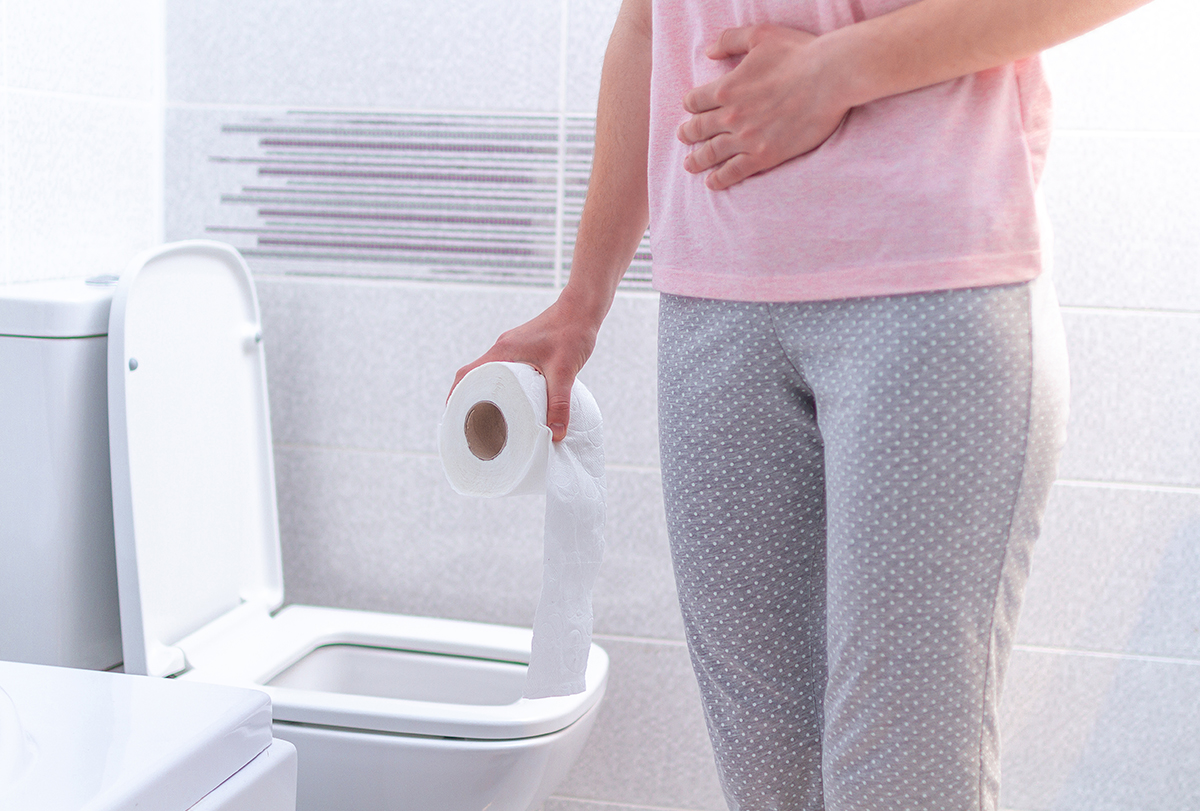
The normal value of water content in stools is approximately 10 mL/kg/day in infants and young children or 200 g/day in teenagers and adults. However, in cases of diarrhea, this water content increases significantly. (1)
Diarrhea is caused by a variety of factors, including food poisoning, infections of the gastrointestinal tract, ingestion of certain medications, and underlying medical conditions. Dehydration is a common complication of diarrhea and can be life threatening if not properly managed.
Treatment for diarrhea may include oral rehydration solutions, antibiotics, and dietary modifications. (1)
Acute Versus Chronic Diarrhea
Diarrhea is a common condition that affects individuals of all ages.
When someone experiences a sudden onset of three or more loose or watery stools a day for up to 14 days, the condition is called acute diarrhea. If the episodes last beyond 14 days, the condition is labeled chronic or persistent diarrhea.
Acute diarrhea is usually caused by an infection, while noninfectious causes become more likely as the diarrhea lasts longer and becomes chronic.
Individuals should seek medical attention if diarrhea persists beyond 14 days or if dehydration or extreme abdominal pain occurs. (1)
Causes of Diarrhea
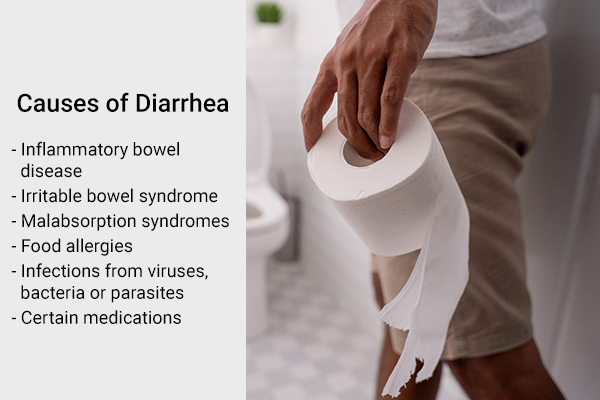
Chronic diarrhea can have many different causes, and the exact etiology is often difficult to pinpoint. In general, any process that results in an increase of water in the stool can lead to diarrhea.
Some of the most common causes of chronic diarrhea include:
- Inflammatory bowel disease
- Irritable bowel syndrome
- Malabsorption syndromes
- Food allergies
- Infections from viruses, bacteria, or parasites
- Certain medications
Other causes of chronic diarrhea include celiac disease, pancreatic insufficiency, microscopic colitis (gut inflammation), and endocrine disorders. In some cases, the cause of chronic diarrhea may not be identified, and in such cases, further investigation may be necessary. (2)
Diarrhea due to different germs
Experts explain how diarrhea can be caused by different germs such as viruses, bacteria, or parasites.
Viral diarrhea
Viruses are usually the reason people get sick with stomach problems in the United States. They make a part of the small intestine swollen and cause watery diarrhea.
Sometimes, eating too much sugar can make your diarrhea worse due to the malabsorption of carbohydrates.
If you have an infection, you might have some blood in your poop, but that’s not very common. Four main kinds of viruses cause these problems, with rotavirus and norovirus being the most common.
Rotavirus can make young kids very sick and it spreads easily from person to person. (3)
Bacterial and parasitic diarrhea
Different types of bacteria are known to cause gastroenteritis including Salmonella, Campylobacter, Shigella, and Escherichia coli. However, bacterial gastroenteritis is less common compared to viral gastroenteritis.
Parasites such as Giardia and Cryptosporidium are also known to cause gastroenteritis. (4)
Note: If you spend a lot of time with a baby who has an infection causing diarrhea, you might get infected too.
Symptoms of Diarrhea
Diarrhea is characterized by passing loose, watery stools three or more times a day. People with diarrhea may also experience:
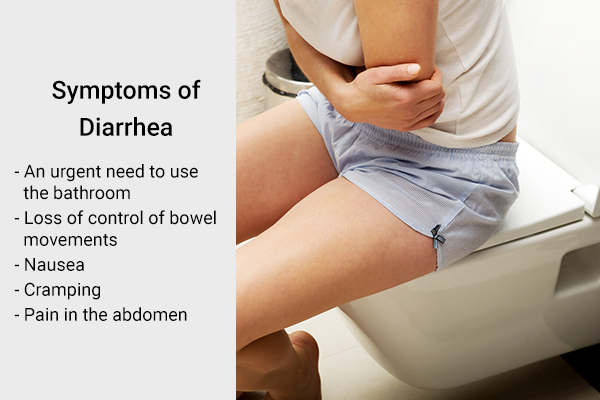
- An urgent need to use the bathroom
- Loss of control of bowel movements
- Nausea
- Cramping
- Pain in the abdomen
In the case of diarrhea caused by certain infections, other symptoms may include bloody stools, fever and chills, lightheadedness and dizziness, and vomiting.
It is important to note that diarrhea can cause both dehydration and malabsorption, and thus it is important to seek medical attention if symptoms persist.
How Does Diarrhea Spread?
Infectious diarrhea can be spread from person to person, from animal to person, or from the environment to person. Infected persons are the primary source of contamination, and it is recommended that infected individuals are isolated to prevent further spread of the disease.
Certain enteric pathogens can be transmitted from animals to humans, such as enteroinvasive (invasive gut infection) Escherichia coli strains and Campylobacter and Listeria monocytogenes, with poorly cooked foods being the primary source of infection.
Contaminated water is also a potential source of infection, although it is less likely than contaminated food. (5)
Treatment for Diarrhea
Treatment for diarrhea depends on how severe it is. Mild cases can be treated by drinking oral rehydration solutions and other fluids.
Patients should have access to a toilet or bedpan and take frequent sips of fluids. In more severe cases, intravenous (IV) fluids may be necessary.
Experts say that you can take medicine such as loperamide or diphenoxylate to help stop the diarrhea. You should take 4 mg of loperamide at first and then 2 mg each time you have diarrhea after that (but not more than 6 doses a day or 16 mg a day).
Note: If you have a fever or see blood in your poop, don’t take loperamide. Also, it’s not safe for kids under 2 years old. Moreover, antibiotics should only be used in select cases, not as a regular treatment. Supportive treatment is usually enough for most patients.
Testing for Diarrhea
For any patient complaining of chronic diarrhea, a thorough history and physical examination are always recommended.
In addition, certain laboratory tests should also be carried out to acquire a better understanding of the condition. These tests include: (2)
- Complete blood count with differential to look for infection and anemia
- Erythrocyte sedimentation rate and C-reactive protein to look for underlying infections
- Thyroid function tests to check for hyperthyroidism
- Complete metabolic profile to examine for electrolyte abnormalities and renal function
- Total protein and albumin to find signs of protein malnutrition
- Stool occult blood test to look for a gastrointestinal bleed
Transmission and Spread of Diarrhea
The illness caused by rotavirus or norovirus in adults is usually not severe. The time between getting infected and showing symptoms is usually 1–3 days.
In places with a moderate climate, most infections occur during the winter. In the United States, there is a seasonal increase in rotavirus illness from November to March each year.
Norovirus usually affects older children and adults, and the infection can happen at any time of the year. Norovirus is the main reason for viral gastroenteritis outbreaks in adults and children, and these outbreaks can happen from contaminated water or food.
The virus is very contagious, so it can also spread from person to person quickly. The incubation period for norovirus is typically 24–48 hours. (6)
Diarrhea in Children and Infants
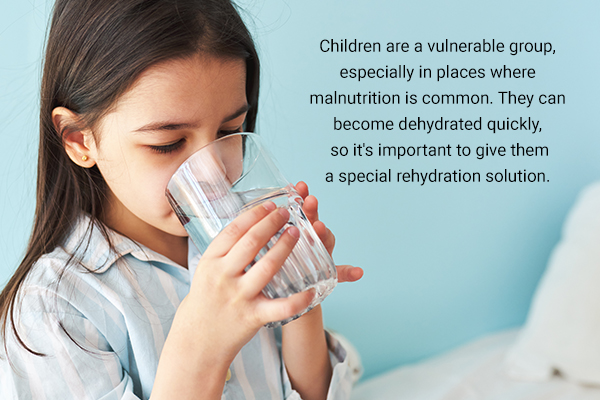
Children are a vulnerable group, especially in places where malnutrition is common. They can become dehydrated quickly, so it’s important to give them a special rehydration solution (many are available in stores). (7)
Carbonated drinks and sports drinks are not suitable for children under 5 because they don’t have the right mix of sugar and salt.
If the child is being breastfed, keep breastfeeding going. But if the vomiting is severe or the child is very dehydrated, they may need to get fluids and electrolytes through an IV.
Once the child can drink fluids without vomiting and feels like eating again, they can start eating slowly. There’s no evidence that eating bland food (such as cereal, gelatin, bananas, or toast) helps.
Note: Medical professionals say that for children over 5 years old with watery diarrhea (without blood), it’s safe to give them antidiarrheal drugs.
Prevalence of Diarrhea in India and Other Facts
Diarrhea is a common problem that can be short term in some illnesses and long term in others such as HIV/AIDS. In India, it’s a big problem for young kids and is one of the top reasons they die (13% of all casualties every year in kids younger than 5 years of age).
The good news is that India has been working hard to reduce the number of kids who die before they turn 5 (total casualties decreasing from 2.5 mn in 2001 to 1.5 mn in 2012). They have done this by giving vaccines and treating diarrhea and breathing problems.
However, even though fewer kids are dying, diarrhea is still a big problem and it’s one of the top reasons kids die. It kills about 300,000 kids in India every year. (8)
Complications of Diarrhea
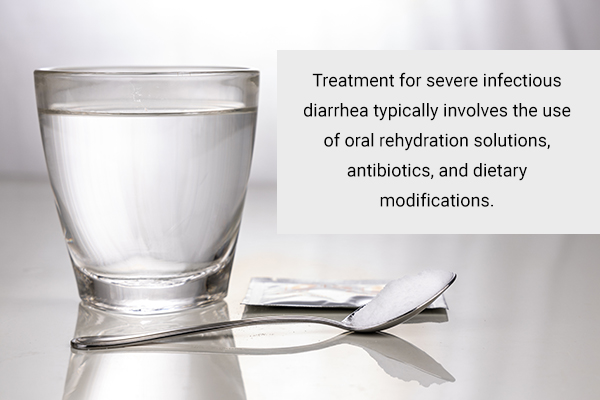
Severe infectious diarrhea can be a potentially life-threatening condition, characterized by the daily production of 2 liters or more of stool. This can lead to serious dehydration and electrolyte imbalances, such as hypokalemia, which can have serious consequences if not managed properly.
Treatment for severe infectious diarrhea typically involves the use of oral rehydration solutions, antibiotics, and dietary modifications. It is important to seek medical attention promptly when experiencing severe diarrhea, to prevent serious complications. (5)
When to See a Doctor
Although many cases of diarrhea can be treated at home with over-the-counter remedies, rest, and a temporarily restricted diet, it is important to consult your doctor if diarrhea persists for more than 2 days without improvement or if you become dehydrated.
In the case of dehydration or other symptoms, such as black or bloody stools, severe abdominal pain, or a fever of 102°F or higher, it is important to seek immediate medical attention at the emergency room.
Your doctor can advise you on what to do if any of these symptoms appear. Taking these measures will ensure that you get the most appropriate and timely treatment for your diarrhea.
Final Word
Loose motions, also known as diarrhea, are a common problem characterized by frequent watery stools that occur more frequently than usual. This condition occurs when the food and liquids consumed pass too quickly or in too large an amount through the colon.
Other common symptoms of loose motions include abdominal cramps, abdominal pain, fever, bloating, and weakness. It is important to seek medical attention if symptoms become severe or last longer than a few days.
 Continue Reading8 Home Remedies to Stop Loose Motions and Preventive Tips
Continue Reading8 Home Remedies to Stop Loose Motions and Preventive Tips
- Was this article helpful?
- YES, THANKS!NOT REALLY


